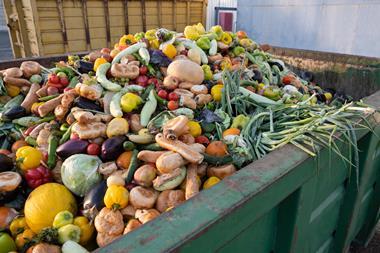An exclusive survey for The Grocer shows only half the nation is recycling its food waste. How can retailers alter habits to their advantage?
More than half the country ranks food waste as the biggest threat to the environment. So why is it less than half the nation recycles unused food, compared with more than nine out of 10 who do so with tin cans?
This week, ShopWaves, the first in a new monthly series of consumer polls by Him! for The Grocer, shows a dire lack of local authority infrastructure is making it impossible for consumers to act on their key environmental concerns.
The survey reveals just 48% of people recycle food waste - compared with 91% who recycle tin cans. Crucially, only 46% of councils in the UK currently offer food waste recycling facilities compared with 98% for cans. That is despite food waste being chosen as the most pressing environmental concern by one in five respondents and 54% ranking it in their top three most pressing environmental concerns out of 10 options.
Wrap estimates the average household throws away food worth £520 every year. And supermarkets are surprisingly keen to help them prevent this.
“We estimate a family can save as much as £50 a month by reducing food waste,” says Asda’s corporate sustainability manager Sara Belmont. “We are looking at ways in which we can encourage people to change their habits, which will help them save money but also reduce the amount of waste.”
Asda is working with Defra to come up with new strategies that will actively discourage shoppers from spending so much money on food, hoping the money saved will be spent on non-food items in store.
Consumers certainly hold supermarkets responsible for waste: 37% of the 532 respondents blamed multibuys. And though Wrap concluded in a report published in December that bogofs have a limited impact on the amount of food thrown away, Sainsbury’s is among the supermarkets including different products in the same deal. “That means shoppers don’t buy twice as much as they need, and the feedback is they’re wasting less because of that,” says corporate affairs director Alex Cole.
Consumers also take some responsibility, of course, and 44% admit buying fresh food for their health but not getting round to eating it before it goes off, while 72% said shopping for perishable and fresh foods more frequently and buying less each time would encourage them to reduce their levels of food waste.
However, while 90% say being environmentally friendly is very or somewhat important, nowhere near that number would be prepared to pay more for products if they were assured that they were produced in an environmentally ethical way.
So why bother? Helping customers reduce food waste is an obvious way to tick both those boxes, something Sainsbury’s is hoping to achieve under its new Live Well For Less banner. “We know that if we help people manage waste they’ll reward us with loyalty,” says Cole. “We’re trying to get the message across that not all supermarkets are there to sell you as much as possible.”
Helping customers spend less, instead of tempting them to spend more, will be a tough battleground, especially as 11% cite “reduce consumption” as their most pressing environmental concern.
But being environmentally friendly doesn’t necessarily mean a kick in the profits, according to Louise Nicholls, head of responsible sourcing for M&S Foods.”We thought Plan A would cost us money but it ended up delivering a net financial benefit,” she adds.
Which of the following do you recycle, either through retailer or local council schemes?
- Newspapers & magazines: 94%
- Cardboard & card: 93%
- Glass bottles: 90%
- Tins & cans: 91%
- Plastic bottles & containers: 89%
- Plastic bags: 63%
- Clothes: 71%
- Other: 10%
- I don’t recycle anything: 1%
Source: ShopWaves is a new monthly survey of 500 consumers, conducted for The Grocer by Him! Shopper Research



















No comments yet